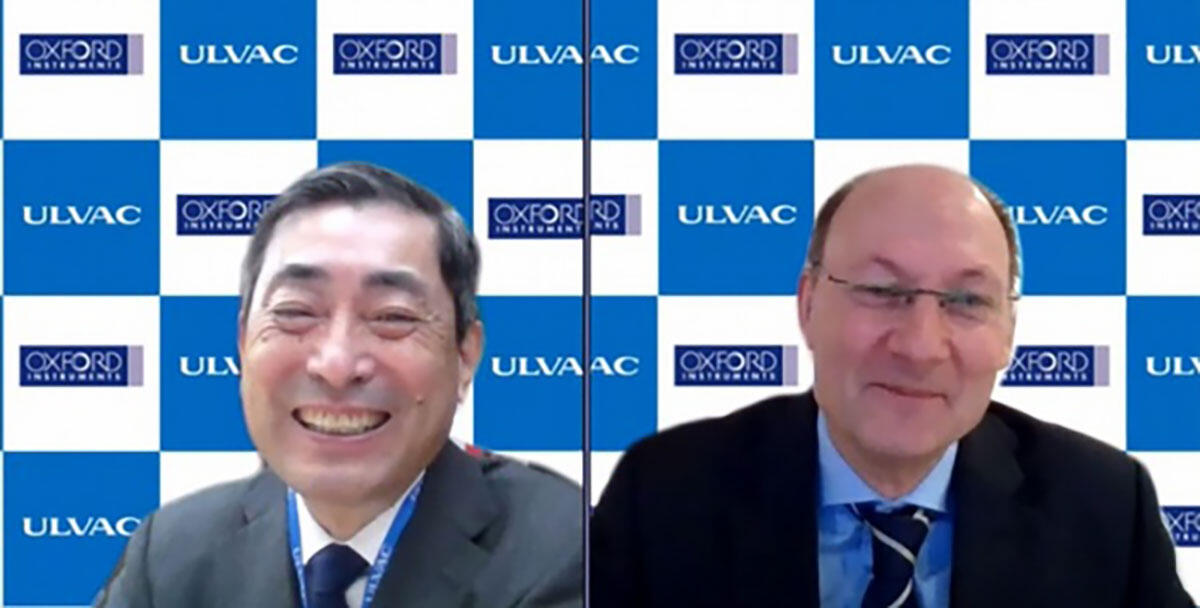
The market for semiconductor lasers is becoming active as a light source for 3D sensing technologies such as LiDAR, which are required for autonomous driving. As one of them, we will introduce a dry process for VCSELs (Vertical Cavity Surface Emitting Laser), which has merits such as miniaturization and energy saving.
VCSEL fabrication flow
1. Epi growth
On a GaAs (gallium arsenide) substrate, AlGaAs / GaAs layers are epigrown as a laminated structure including a DBR (Distributed Bragg Reflector) multilayer film consisting of several tens of pairs or more and an active layer.
2. Patterning & Mask forming
Form a mask pattern to form the epi layer into a column called a mesa
3. Patterning Mesa
Patterning Mesa by dry etching
Process technology for VCSEL
Introduction of Etching module
4. Forming active layer & encapsulation
A specific AlGaAs layer designed near the active layer is oxidatively narrowed by wet oxidation (this oxidative narrowing layer is a very important layer that influences the characteristics of the VCSEL as a current and light confinement structure). It also forms a protective film on the side wall of the mesa.
5. Forming electrode
Electrodes are formed on each of the n-type and p-type layers.
Contact Us
https://www.ulvac.co.jp/en/contact/elec_inquiry/

Introducing the dry etching technology required for the VCSEL process.
VCSEL Mesa process
Chlorine-based gas is used for etching group III-V compound semiconductors such as GaAs used in VCSELs. Since reactive-based conditions are used for AlGaAs / GaAs multilayer films, it is difficult to control the shape and in-wafer uniformity. Furthermore, in etching compound semiconductors, it is difficult to achieve both shape and in-wafer uniformity control based on process conditions alone.
Therefore, the NE dry etching equipment uses the ISM (ICP with Static Magnetic field) method for the antenna structure. Antennas using the ISM method can optimize the plasma distribution, and a very uniform distribution of 3% or less can be obtained with GaAs wafers. The shape distribution based on the actual epi structure is also uniform.
For mesa depth control, the etching depth can be controlled with high accuracy by using the IEP (Interferometry End Point) system. The state of etching can be grasped from the interference waveform obtained by using this system. By counting the number of DBR pairs while monitoring this waveform, etching can be stopped at any depth.
Contact Us https://www.ulvac.co.jp/en/contact/elec_inquiry/

As expanding the market of microfluidics / microstructure devices in the biotechnology or life science fields, the demand for development of high volume manufacturing technique has been increasing. As one of the solutions, we have been developing a process to fabricate these devices on larger-format glass substrates.
In our previous study [1] [2], we reported wet etched glass mold for solder bumping technology which is called "C4NP". The glass mold requires very precisely controllable etching technique. We achieved high accuracy and good uniformity pattern with wet etching in 300 mm whole wafer.
In this study, we applied this etching technique to biotechnology or life science applications. In addition, we combined wet etching, micro-blast for through-hole and direct bonding techniques to make prototype microfluidics devices on larger-format glass substrates.
The following glass substrates were used for capillary plates and through-hole plates of the prototype microfluidics plate.
Material: Corning EAGLE XG
Size: 330.2 mm x 355.6 mm (13" x 14") x 0.7 mm (thickness)
EAGLE XG is one of the most popular glasses for flat panel displays. It is formed by Fusion down draw method therefore clean and smooth surface is formed. These glass substrates were cleaned with detergent and rinsed with DI water before processing. Table 1 shows the process flow.
To fabricate capillary plates, DC inline sputtering machine was used for Cr coating. This Cr film is optimized for HF etching to reduce defects. Then photolithography was used to make capillary pattern etching mask.
The capillary plates were etched to 40 um depth and 100 um width by dipping type etcher. Oscillation and circulation are controlled to improve uniformity over the whole substrate. Also the composition of HF based etchant is optimized for the glass type. Uniform map (see Fig 1) and uniform distribution of capillary depth was obtained (see Fig 2). The depth of 3sigma was 3% (1.2 um) and the width of 3sigma was 3% (2.5um).
Through-holes were made by micro-blasting method. Dry-film photoresist was used for micro-blasting mask. The blast nozzle scans over whole pattern area and digs holes. When the diameter reaches the target value, micro-blast process was stopped.
Mask materials were removed from capillary plates and through-hole plates, and both plates were cleaned again. Bonding process was operated under clean benches to reduce particle. Through-holes and etching pattern alignment marks were used to align, and then both plates were bonded temporarily. After temporarily bonding, the plate was baked and permanently bonded. (see Figs 3 and 4)
Fabricating microfluidics chip array on 13 x 14 inch large glass substrates was succeeded. We propose this technology as a solution for High Volume Manufacturing of microfluidics / microstructure devices.
References
[1] "Lead Free Micro Bumping - Cost & Yield Challenges" K. Ruhmer, E. Hughlett, M. Ishizuka, T. Kojima, T. Asaka, B. Dang, A. Buchwalter, D.Shih, EPTC 2007, Singapore, December 2007.
[2] "Fine Pitch Lead Free Solder Bumping with C4NP" K. Ruhmer, E. Laine, M. Ishizuka, T. Kojima, T. Asaka, Semicon Europe Advanced Packaging Conference, Stuttgart, October 2007.
・ULVAC COATING CORPORATION Productshttp://www.ulcoat.co.jp/en/product_info/glass/
・Contact Ushttp://www.ulcoat.co.jp/en/contact/

Partners and friendly rivals; enabling sustainable growth through collaboration.
Oxford Instruments plc. (headquartered in England, UK), hereinafter Oxford Instruments) was founded in 1959 as a successful technology company spun off from the University of Oxford in the UK. The company supports its customers in addressing some of the world's most pressing challenges, enabling a greener, healthier, more connected, advanced society for all. The company offers a variety of advanced technology products ranging from research and development to manufacturing processes, quality control, and analysis, including cryogen-free dilution refrigerators and superconducting magnets for condensed matter physics research, elemental analysis systems for electron microscopes, laser and optical imaging systems, and deposition and etching systems using plasma technology for semiconductor fabrication processing at atomic level.
In 2019, ULVAC commenced the sale of Oxford Instruments' plasma atomic layer deposition (ALD) systems for mass production solution for gallium nitride (GaN) power devices and also their next-generation atomic layer etching (ALE) system in Japan.We spoke with Dr. Ian Barkshire online.
●Guest [Right]Dr. Ian Barkshire, CEO, Oxford Instruments plc.●Interviewer [Left]Setsuo Iwashita, President and CEO, ULVAC, Inc.
Contents
Growing markets to capture.
Management Strategy, HORIZON
Company culture for Sustainable Growth
Conclusion
1. Growing markets to capture
Iwashita : Oxford Instruments (hereinafter referred to as "Oxford Instruments") and ULVAC, Inc. started to build strategic business collaboration since 2019, and the team has achieved major advancement since then. Dr. Barkshire provided insights on how Oxford Instruments is rapidly growing and capturing business opportunities during this time of drastic change.
This interview was conducted online due to limitations of traveling by COVID-19, however I would like to extend my sincere appreciation to you. I am excited to hear your views on various issues today. We would like to know your views on how a company should be and how it can grow with the fast changes we face.
Barkshire : Thank you very much indeed, Iwashita-san. I would just like to say how pleased I am to be able to join this conference call with you today. It's a great pleasure, especially given the progress our teams have been making over the last year.
Iwashita : Thank you. Yes. And it's true. The UK and Japan, we are two countries worlds apart. I think it is important for us to exchange market views and our philosophy of management. We are facing new challenges. The market is growing, and we are competitors, but we are partners at the same time. We can collaborate with each other.
Barkshire : I totally agree. Personally, I passionately believe that as technology advances more quickly, our customers' demands will continue to grow. It is important that through the development of our respective core technologies, we can deliver increased value to our customers. We can do so by collaborating to reach new customers and by developing our technologies more quickly. This should create a great advantage for both of our organizations.
Iwashita : So in the East Asia in both semiconductor and electronics areas, we understand that from the customer's voice, almost all our customers now they are very happy because they receive the biggest order ever happen in the past. And this will keep growing. So that's why now it's the right time we both companies work together and try to expand our business.
Barkshire : So whilst this creates great opportunities, I think it also creates new challenges. Challenges around operations, lead times and supply chains, but also in how we can effectively reach and engage with our customers. This is why strategic partners present such a benefit. A few carefully selected, strategic partners that can help us rapidly grow together so that we can both continue to be successful.
Iwashita : In which market is Oxford Instruments especially focused ?
Barkshire : At Oxford Instruments, we have specialized technologies that span three key areas: the ability to analyze and characterize materials, imaging and characterization within life science, and also our semiconductor expertise. We provide key capabilities across a number of important markets such as power electronics, life science, battery technologies, and in a broad range of material science areas including quantum technologies, which may revolutionize many industries. In life science, we're helping people in gene therapies and new drug diagnosis, we're indirectly involved in number of cancer trials by providing the ability to image, analyze and understand the fundamental mechanisms of diseases. We are involved with pharmaceutical and life science research all around the globe with the leading institutes and industrial companies. In the semiconductor arena, our analysis and imaging capabilities are used broadly by all of the leading high volume manufacturing companies. And our semiconductor processing tools, very much like ULVAC, are used across applied R&D, but also increasingly in high volume manufacturing for energy and data communication applications.
2. Management Strategy, the HORIZON
Iwashita : I understand that now you're conducting Horizon, a transformational program in your group company. Can you tell us something about the Horizon? What is the future target?
Barkshire : Our Horizon Strategy is all about delivering on the inherent potential within Oxford Instruments. We have been transforming our company into a customer-centric, market-driven group where all of our efforts are focused on the needs and demands of our customers today and their future requirements. This has involved developing stronger commercial teams to better understand the needs and requirements of our chosen end markets. We've also focused the group into a number of niche technologies where we can provide leadership and create significant value for our customers. This has provided a lot of synergies and innovation. We've been investing in R&D so that we can create sustained technical differentiation in our chosen market and create even more value for our end customers. Through Horizon we have worked to deliver sustainable long-term revenue growth, but also to significantly improve the performance and quality of our business, which we recognize as the operating margin. Over the last five years since the implementation of the Horizon strategy, we've increased the operating margin from around 12% to 18%. As a technology company and based on the capabilities that we have within the organization, our ambition is to increase our margins to around 20%.
Iwashita : Very good. Very challenging target. Yes. So along with your world business strategy, how do you value the Japan market? How important this market is to you?
Barkshire : We think of all markets as important. If you look at our global revenues, we have roughly a quarter in the US, a quarter in Europe, a quarter in China, and a quarter in the rest of Asia. Oxford Instruments has always had a strong and proud relationship with our customers in Japan across a number of end applications. That's why we've had a direct sales and marketing team there for many years. We see Japan as a leading market for new technologies, and advanced companies.
Continued on next issue.(two-part series)

The market for lithium-ion batteries (LiBs) is expected to grow rapidly due to their use in a wide range of applications, such as smartphones, drones, and electric vehicles (EVs).In the automotive market, emissions regulations are being tightened in major countries, as exemplified by Euro 7 in Europe, the Zero-Emissions Vehicle (ZEV) regulations being strengthened in California, and China moving toward the New Energy Vehicle (NEV) regulations. It is becoming difficult for conventional engine technologies based on use of fossil fuels to comply with these regulations. For this reason, automakers are beginning to shift their focus toward popularizing EVs and plug-in hybrid (PHV or PHEV) vehicles1).
According to a survey by a think tank, more than 60 million EVs and PHVs are expected to be sold globally in 20402), and the demand for battery capacity is also expected to surge. Consequently, there is a pressing need to enhance production facilities and develop large-capacity batteries, with battery makers competing furiously toward commercialization of the technology.
*This article appeared in the September 2019 issue of the technical journal No. 83.
Anodes in LiBs
Current LiBs and next-generation LiBs using an Li metal anode
An LiB has a structure in which a cathode, an anode, and a separator are stacked and immersed in an electrolyte, as shown in Figure 1. As mentioned above, development efforts related to the materials and manufacturing methods of the various components are underway to increase battery capacity. Currently, a graphite-coated film is used for the anode, with a theoretical energy density of 370 mAh/g.Replacing this graphite anode with a material that has greater energy density would increase battery capacity3). In particular, it is considered ideal to switch to an Li metal anode with a theoretical energy density of 3860 mAh/g, which is gaining attention as a likely next-generation anode.LiB
Issues facing an anode using roll-press Li foil
Although Li metal is ideal for increasing capacity, it has issues in terms of safety and service life. These issues are presumed to be caused by dendrites, which are needleshaped precipitations of Li metal that occur over the life of repeated charging/discharging cycles4). As these dendrites grow, they cause short circuiting between the cathode and the anode, potentially causing a fire, etc. Additionally, as shown in Figure 2, Li that does not enable charging/ discharging occurs, called "dead Li" because it falls off during the growth stage, posing an issue in terms of battery life5). It is said that dendrites are caused by the current concentration that occurs on the anode during charging6), and it is considered that flattening the Li surface and forming a uniform passivation film at the same time could improve the current distribution, thereby suppressing the formation of dendrites.
You can download full article with your registrationhttps://www.ulvac.co.jp/r_d/technical_journal/tj83j/
References
1) Mizuho Bank Industry Research Division: Mizuho Industry Focus 205, 11 (2018) (in Japanese).2) New Energy and Industrial Technology Development Organization: Focus NEDO 69, 9 (2018).3) New Energy and Industrial Technology Development Organization: NEDO Technology Roadmap for Stationary Battery 2013 (Battery RM2013), 10 (2013) (in Japanese).4) Electrochemical Society of Japan, Committee of Battery Technology, Battery Handbook (Ohmsha, 2010), p. 58 (in Japanese).5) Xin-Bing Cheng, Rui Zhang, Chen-Zi Zhao, and Qiang Zhang: Chemical Reviews, 117, 10406 (2017).6) Kiyoshi Kanamura, Naohiro Kobori, and Hirokazu Munakata: BLIX, Symposium on Energy Storage, San Jose (2017), p. 6.




